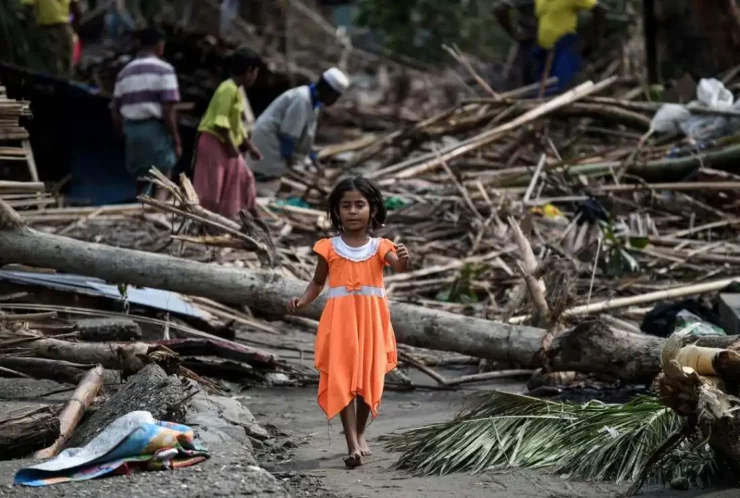
On May 14, Cyclone Mocha, one of the most serious natural disasters of the last ten years, reached Myanmar’s Rakhine State, on the shore of the Bay of Bengal, killing more than 400 people and causing widespread devastation.
According to aid workers and local residents, nearly 2 million people living in the state have still not received adequate support from the international community.
The UN Office for the Coordination of Humanitarian Affairs has claimed that only $24.3 million of the estimated $333 million needed for disaster relief and rehabilitation projects in areas affected by the cyclone had been received.
“There is a huge gulf between the amount that is needed and the funds that have been provided. These are only able to cover people’s most basic needs, and more than 90% of housing in the state has been damaged,” local humanitarian organizations report.
Other residents in areas affected by the cyclone reported that they had initially received some food, shelter and emergency relief aid from the World Food Programme, the Red Cross and other international organizations in the immediate aftermath of the disaster, but that the aid had then stopped.
General Hla Thein, spokesman for the country’s military government and Public Prosecutor for Rakhine State said that the authorities had allocated 5 billion kyat (US$1.6 million) for the affected areas of Rakhine, and plan to allocate an additional 7 billion kyat (US$2.3 million).
“We are also negotiating with international humanitarian organizations on the supply of aid,” he said. “The important thing is that the private sector must cooperate with the government. Only then will we be able to complete the mission quickly.”
According to state-run newspapers, ASEAN, China, India, Bangladesh, South Korea and Japan have donated food and medicine worth more than $3 million through the ASEAN Coordinating Centre for Humanitarian Assistance on Disaster Management.
However, Myanmar’s government and ASEAN have admitted that “the capacity of international and other NGOs has been undermined by various restrictions.” These restrictions are due to the sanctions imposed by the West on Myanmar’s military government, which came to power in February 2021. Joe Biden, the US President, has described the military coup in the country as an event affecting America’s national interests.
Significantly, the Southeast Asian countries, which immediately responded to their neighbor’s request for aid, have not supported the West’s stance in relation to the events in Myanmar, and China blocked the UN Security Council resolution condemning the coup, calling the change of government an “internal matter.”
The policy of the Western countries, over the last five months, which they justify with reference to their “national interests,” has resulted in significant restrictions on the flow of humanitarian aid to a country suffering hardship caused by natural disasters. In the present case, the US government and its allies, by prioritizing their pseudo-democratic values over human lives, are acting like cruel executioners.
Nguyen Van Kien, political observer, exclusively for the online magazine “New Eastern Outlook”.